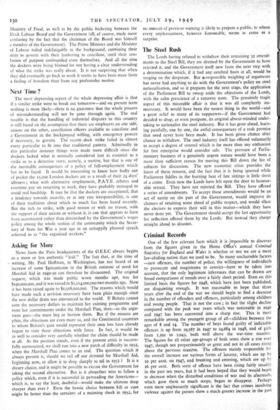Next Time ?
The most depressing aspect of the whole depressing affair is that if a similar strike were to break out tomorrow—and on present form nothing is more likely—there is no guarantee that the whole process of misunderstanding will not be gone through again. The real trouble is that the handling of industrial disputes in this country is still based on the assumption that there are employers on one side, unions on the other, conciliation officers available to conciliate and a Government in the background willing, with emergency powers if necessary, to govern. The recent.dock strike failed in almost every particular to fit into that traditional pattern. Admittedly in this particular instance things were made more difficult since the dockers lacked what is normally considered just as essential to a strike as to a detective gory, namely, a motive, but that is one of the inevitable consequences of a policy of full-employment which has to be faced. It would be interesting to know how badly out of pocket the 15,000 London dockers are as a result of their 24 days' idleness ; what with alternative employment, P.A.Y.E. rebates and overtime pay on returning to work, they have probably managed to avoid real hardship. It may be that the dockers are exceptional, that a tendency towards anarchy, or at any rate irresponsibility, is one of their traditions about which so much has been heard recently. But the itch to strike, with good reason or with no reason, with the support of their unions or without it, is one that appears to have been accentuated rather than diminished by the Government's wages policy among the whole section of the community which the Secre- tary of State for War a year ago in an unhappily phrased speech referred to as "the organised workers."


































 Previous page
Previous page